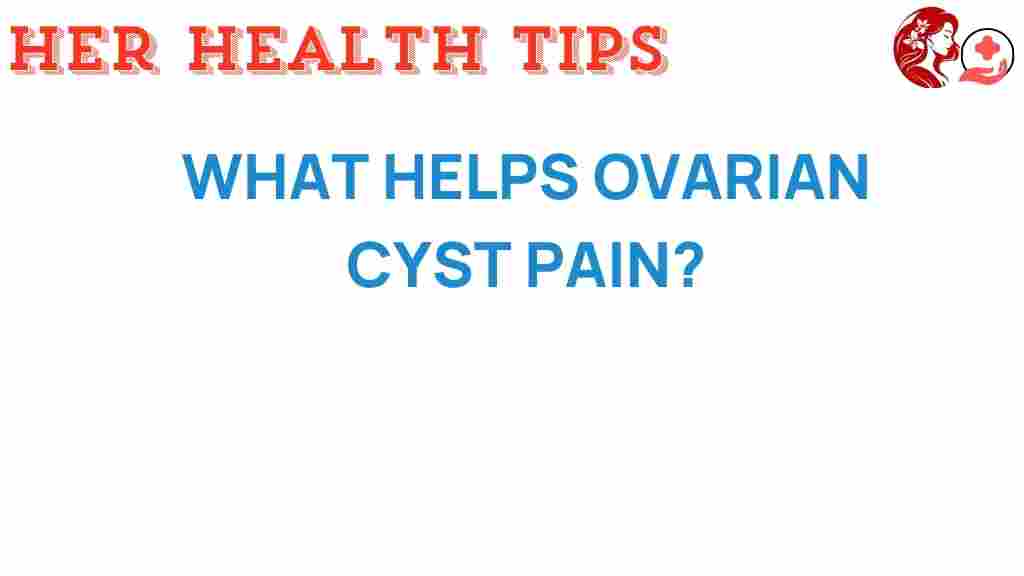Unraveling the Mystery: What Truly Eases Ovarian Cyst Pain?
Ovarian cysts are fluid-filled sacs that develop on the ovaries and are quite common among women of reproductive age. For many, they are harmless and cause no symptoms. However, for some women, ovarian cyst pain can be a significant issue, leading to discomfort and distress. Understanding the causes of ovarian cyst pain and exploring effective remedies, treatments, and lifestyle changes is essential for women’s health. In this article, we’ll delve deep into the world of ovarian cysts, uncovering what truly eases this pain.
Understanding Ovarian Cysts and Their Pain
Ovarian cysts can be classified into two main types: functional and pathological. Functional cysts are related to the menstrual cycle and are generally harmless. Pathological cysts, on the other hand, may require medical intervention. The pain associated with ovarian cysts often arises from the following factors:
- Size of the cyst: Larger cysts can cause more noticeable pain.
- Rupture: A cyst that bursts can lead to sudden and severe pain.
- Pressure on surrounding organs: Cysts can exert pressure on the bladder or rectum, causing discomfort.
- Twisting: An ovarian cyst can cause the ovary to twist, leading to intense pain and potential complications.
Identifying Symptoms of Ovarian Cyst Pain
Recognizing the symptoms of ovarian cyst pain is crucial for seeking appropriate remedies and treatment. Common symptoms include:
- Dull ache or sharp pain in the lower abdomen
- Pain during intercourse
- Changes in menstrual cycle
- Pressure symptoms, such as frequent urination or difficulty emptying the bladder
- Nausea or vomiting in cases of rupture
Remedies for Ovarian Cyst Pain
When it comes to alleviating ovarian cyst pain, various remedies can be considered. These range from medical treatments to lifestyle changes and holistic approaches.
1. Medical Treatments
Consulting a healthcare provider is essential for personalized medical advice, especially when symptoms are severe. Potential medical treatments include:
- Hormonal Birth Control: Hormonal contraceptives can help regulate the menstrual cycle and reduce the likelihood of cyst formation.
- Pain Medication: Over-the-counter pain relievers such as ibuprofen or acetaminophen can provide immediate relief.
- Surgery: In cases of large cysts or those causing severe pain, a doctor may recommend surgical options such as cystectomy or oophorectomy.
2. Holistic Approaches
For those seeking natural pain relief, several holistic approaches can be beneficial:
- Herbal Remedies: Herbs like ginger and chamomile are known for their anti-inflammatory properties and can soothe discomfort.
- Acupuncture: This traditional Chinese medicine technique may help relieve pain and restore balance.
- Essential Oils: Oils like lavender and peppermint can be diffused or applied topically for soothing effects.
3. Lifestyle Changes for Pain Management
Integrating certain lifestyle changes can significantly impact ovarian cyst pain and overall health:
- Dietary Adjustments: A diet rich in fruits, vegetables, and whole grains can support hormonal balance. Consider reducing processed foods and sugars.
- Regular Exercise: Engaging in regular physical activity can help manage stress and improve circulation, which may alleviate pain.
- Stress Management: Techniques such as yoga, meditation, and deep breathing exercises can help reduce stress levels, which is beneficial for hormonal health.
4. Heat Therapy
Applying heat to the lower abdomen can be an effective way to ease ovarian cyst pain. Here are some methods:
- Use a heating pad or warm compress for 15-20 minutes.
- Take a warm bath to relax the pelvic muscles.
Troubleshooting Tips for Ovarian Cyst Pain
If you find that your ovarian cyst pain persists despite trying various remedies, consider the following troubleshooting tips:
- Keep a Pain Diary: Documenting your pain levels, triggers, and relief methods can help identify patterns and effective strategies.
- Consult a Specialist: If pain is severe or recurrent, seek advice from a gynecologist or a specialist in women’s health.
- Explore Alternative Therapies: Consider therapies like physical therapy or chiropractic care, which may offer additional pain relief.
When to Seek Medical Advice
While many cysts are benign, certain symptoms warrant immediate medical attention:
- Severe abdominal pain
- Fever or vomiting
- Rapid breathing or faintness
If you experience any of these symptoms, it is crucial to seek medical advice promptly.
Conclusion
Ovarian cyst pain can be a challenging experience for many women. However, understanding the nature of ovarian cysts and exploring various remedies, treatments, and lifestyle changes can provide significant relief. Whether opting for medical intervention or holistic approaches, women should feel empowered to take control of their health.
Always consult with a healthcare provider for personalized medical advice and before starting any new treatment or remedy. By prioritizing women’s health and being proactive about pain management, many women can find effective solutions to ease their ovarian cyst pain.
For further reading on women’s health issues, check out this comprehensive guide. Additionally, you can find more information on holistic approaches to health by visiting this resource.
This article is in the category Reproductive and created by HerHealthTips Team
